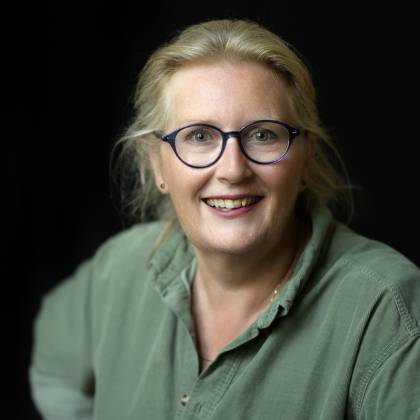
Would you like to learn more about commemorative funds?
Hanna Philips would be happy to discuss all the options with you.
INTERVIEW - Speaking about the importance of music education in schools, Frank and Liesbeth Schreve explain why they want to contribute to creative forms of music education through their commemorative fund.
Fifteen teenagers are onstage. Some are obediently focused, while others giggle awkwardly or assume a defiant cool-kid attitude. After some time, though, a joint musical presentation emerges. These youngsters are all students at the Sweelinck College, a secondary school located near the Concertgebouworkest’s own home in Gabriël Metsustraat. The school and the orchestra recently teamed up as part of a mainly classroom-based education project. Frank and Liesbeth Schreve made the musicians’ visit to the schools possible with their fund, and attended the final performance in the Amsterdam Hall.*
In the school workshops, the pupils created a piece of music based on excerpts from Mahler’s Ninth Symphony. Frank Schreve looks back on the presentation and describes how the youngsters responded to the project: ‘In a group like this, there are always a few who don’t want to join in. But once they’re engaged, you can see a change happen. The music takes hold of them, and they get involved. It’s amazing.’ Frank and Liesbeth say the special performance in the Amsterdam Hall confirms their conviction that music education in schools is invaluable.
Liesbeth has played the piano most of her life and realises that her own great love of classical music may well have taken root when she was in secondary school. It was all down to a wonderful teacher, she says: ‘Our music teacher was a performing musician and brought music into the school in a very special way. I remember him talking about music like the St Matthew Passion. He would give us such an instant insight into the music that it was really fascinating to then listen to or perform it. We even had a school orchestra. I played percussion because there was nothing for me to do as a pianist in the orchestra.’
Frank and Liesbeth feel all children deserve such a wonderful music teacher. Liesbeth says, ‘I think a school that doesn’t teach music is an impoverished school. Music education adds something important to the overall school system. It’s all about focus, fun and excitement – children doing something together. It’s very different from doing sums. Music education provides real enrichment.’ Frank adds, ‘It doesn’t necessarily have to be classical music, and it’s not the case that everyone should learn an instrument and give concerts. Singing together from an early age is very important, too, as is learning to listen. There are so many ways to get kids involved in music at school.’
Frank, for his part, took violin lessons up until he completed secondary school. He says his keen interest in music is linked with a fond memory: ‘As a twelve-year-old boy, I went to visit my grandparents in New York. They took me to Carnegie Hall to see David Oistrakh perform the Tchaikovsky Violin Concerto with the New York Philharmonic. That concert made a huge impression on me. And that’s where it all started.’ Indeed, when the Schreves established their commemorative fund in 2008 to support music education, they named it after Frank’s grandparents: the Jacobson Fund.
Frank continues, ‘When we established our fund, music education was largely absent from Dutch classrooms. Our aim was to promote it, and we had to start somewhere.’ In the early days, they would support a single musician at one school. Later, the orchestra developed educational apps enabling group teachers to work without any specific musical experience, using stories, interactive games and illustrations to introduce children to the symphony orchestra. Liesbeth says, ‘A structural education programme only really got off the ground when the orchestra took on Lili Schutte, its education manager. And now that the orchestra has its new home base and can take advantage of all the resources it offers, so much is happening we can’t keep up! It’s a great success.’ Frank adds, ‘Fortunately, music education has made quite a comeback in Amsterdam, so we’re now able to build on what’s happening in classrooms.’
The most important project Liesbeth and Frank facilitated with their fund in 2019 involved four primary schools and culminated in school concerts at the orchestra’s home in Gabriël Metsustraat. Over 400 children aged four to eight from sixteen classes got down to work in their classrooms with beta versions of the Carnival of the Animals and Peter and the Wolf educational apps. Members of the orchestra would drop in to visit, so the children also got a chance to listen to the music and see the various instruments up close. Frank and Liesbeth attended the concerts. ‘We enjoyed them so much!’ says Liesbeth. ‘The children were brought in from all over Amsterdam in buses sponsored by ING. Once in the hall, during the concert, we saw something come over the children. With all the music, singing and a bit of theatre, they got so into it! Right there in the hall, a new kind of joyfulness emerged. Their enthusiasm was mutually contagious, too – you could just see them beaming.’
*The project involving the Sweelinck College was made possible by the Irwan Rachman Fund, another of the Foundation Concertgebouworkest’s commemorative funds.
Door Marije Bosnak

